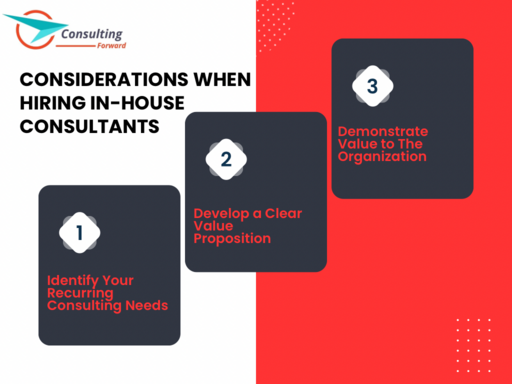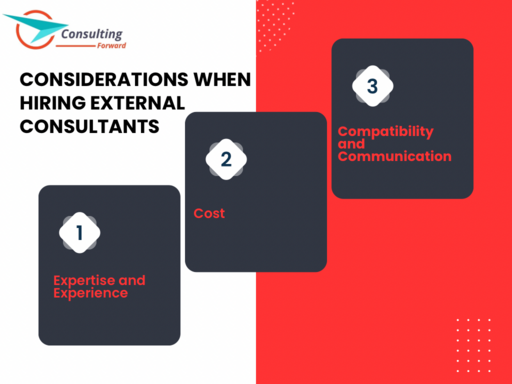In-house Consultants vs. External Consultants: What’s the difference?


In-house consultants or internal consultants are like the secret weapons of a company. They are professionals who work exclusively for the organization, just like full-time employees. These consultants possess specialized knowledge and serve as internal experts, providing valuable guidance on specific matters. They have an in-depth understanding of the company’s operations, culture, and goals, allowing them to offer tailor-made solutions to meet the organization’s unique needs. With their close collaboration, continuous support, and commitment to the company’s success, in-house consultants are trusted members of the team, contributing to the growth and development of the organization from within.
External consultants are professionals hired by organizations to provide expert advice and assistance on various projects. These consultants are not permanent employees of the organization but rather work on a temporary or contractual basis. They are like the “hired guns” of the business world, bringing in their specialized knowledge and skills to tackle specific problems or challenges. These consultants can be freelancers or hired from a different consulting company like Bain or BCG etc.
External consultants offer a fresh and objective perspective to the organization, as they are not influenced by internal biases or politics. They bring a wealth of experience from working with other clients and industries, which allows them to offer innovative solutions. These consultants can assist with a wide range of tasks, such as strategic planning, process improvement, organizational restructuring, or implementing new technologies. Their main goal is to help the organization improve its performance and achieve its objectives. With their external viewpoint, expertise, and solutions-oriented approach, external consultants are like valuable partners who contribute to the growth and success of businesses.
In-house consultants bring numerous benefits to a company’s operations and strategic planning. By working directly within the company, in-house consultants foster seamless communication, ensure swift implementation of recommendations, and build lasting relationships with stakeholders. Additionally, they offer cost-effectiveness, knowledge transfer, flexibility, and continuous improvement.
As integral members of the internal team, in-house consultants enjoy immediate access to relevant data, resources, and personnel. This fosters seamless collaboration, enables timely decision-making, and ensures swift implementation of recommendations.
In-house consultants have the opportunity to build long-term relationships with stakeholders. This establishes a deeper understanding of the company’s dynamics, leading to a more significant impact on the overall performance of the organization.
In-house consultants are fully committed to the success and growth of the company. Since they are employed directly by the organization, they are invested in its long-term development. This commitment translates into continuous support, monitoring progress, and fine-tuning strategies.
External consultants offer several advantages that can benefit companies. These consultants bring a fresh perspective, specialized expertise, and unbiased insights to help drive growth and success. Their outside viewpoint allows them to identify areas for improvement and untapped opportunities. With their deep knowledge in specific areas, they can provide valuable expertise that may not be readily available within the organization. Additionally, their objectivity helps them analyze data objectively and offer unbiased recommendations.
External consultants bring a fresh set of eyes and a different perspective to the table. They are not rooted in the internal dynamics, politics, or biases of the organization. This fresh perspective allows them to identify areas for improvement, inefficiencies, and untapped opportunities that may not be evident to those within the organization. By challenging the status quo and offering innovative solutions, external consultants can stimulate positive change and drive growth.
External consultants often possess specialized knowledge and experience in specific areas or industries. They bring a wealth of best practices, industry benchmarks, and up-to-date insights that can significantly benefit a company. Whether it’s in areas such as finance, marketing, operations, or technology, external consultants can provide deep expertise that may not be readily available within the organization. This expertise can lead to the implementation of cutting-edge strategies and tactics that propel the company forward.
Being outside the organization, external consultants offer a neutral and unbiased perspective. They are not influenced by internal politics, personal relationships, or preconceived notions. This objectivity allows them to analyze data objectively, identify root causes of issues, and provide accurate and unbiased recommendations. This outside perspective can help break through groupthink, address conflicts of interest, and lead to better decision-making. Additionally, it can provide a sense of validation to existing ideas or bring to light any blind spots that may exist within the organization.
When faced with a decision between in-house consultants or external consultants, it can be quite the dilemma. On one hand, in-house consultants bring a deep understanding of the inner workings of the organization and possess insider knowledge. On the other hand, external consultants come with a fresh perspective and a breadth of experience from working with different companies.
The choice ultimately depends on the specific needs and goals of your organization. Do you value familiarity and loyalty from your consultants? If so, in-house consultants may be your best bet. They are already familiar with your culture, processes, and team dynamics. They can tap into their knowledge of the organization to provide tailor-made solutions.
However, if you’re seeking innovative ideas and unconventional approaches, external consultants can inject new life into your organization. They bring a diverse range of experiences and can offer insights that may not have been considered before. Moreover, they can bring a level of objectivity and impartiality that can be difficult to achieve with in-house consultants.
When it comes to hiring in-house consultants, it’s important to consider a few key factors. Understanding your organization’s recurring consulting needs is crucial in determining if an internal consulting group is the right choice and where it can provide the most value. Developing a clear value proposition for the group, highlighting their expertise and focus areas while setting realistic expectations, is essential.

Take the time to analyze and identify the consulting needs that your organization will have in the coming years. This evaluation will help determine if an internal consulting group is justified and where they can provide the most value.
Establish a clear value proposition for your internal consulting group. Define their areas of expertise and focus, highlighting where their knowledge can have the greatest impact. Clearly communicate what they will not handle to set expectations and align their work with organizational goals.
Actively showcase the value that your internal consulting group brings to the organization. Ensure they deliver impactful results and tangible benefits. By highlighting their expertise, problem-solving capabilities, and contributions, their value will be recognized and appreciated.
When it comes to hiring external consultants, there are a few important things to keep in mind. Bringing in outside experts can provide valuable insights and support for your organization, but it’s essential to make informed decisions. From expertise to cost to compatibility, each consideration plays a role in selecting the right consultants for your needs. Taking the time to carefully assess these factors will help ensure a successful collaboration and ultimately benefit your organization’s goals.

It’s crucial to find consultants who have the right knowledge and experience in the areas you need help with. Take the time to research and identify consultants who have a proven track record of success in similar projects. This will ensure that you’re getting the expertise you require.
Hiring external consultants can be expensive, so it’s important to consider the cost implications. Evaluate your budget and determine if you have the financial resources to engage consultants. Compare the cost of hiring consultants with the potential benefits they can bring to your organization. Remember to also factor in any additional fees or expenses that may arise during the project.
It’s essential to ensure that the consultants you hire can work well with your team. Look for consultants who are not only knowledgeable but also able to effectively communicate and collaborate with your staff. Good compatibility and communication will help ensure that the project runs smoothly and that everyone is on the same page.